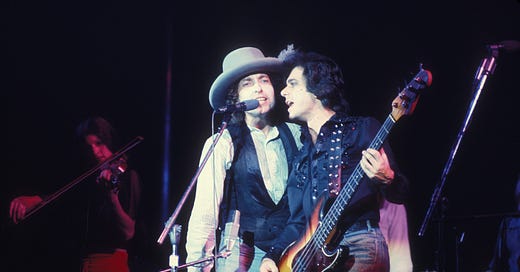ROB STONER ON BASS . . . AND VOCALS, GUITAR, ARRANGEMENTS, AND MORE
DYLAN'S ROLLING THUNDER SIDEMAN TAKES CENTER STAGE: A CONVERSATION
IF you're a music fan, you know the work of Rob Stoner. You might know his name, his bass, and his harmony singing with Bob Dylan's 1975-1976 Rolling Thunder Revue, and his playing on Dylan's Desire album from the same period. Stoner also was co-band leader, and with Dylan, the arranger, for the live albums Hard Rain (from RTR, 1976), and Live at Budokan (recorded in 1978, from"The World Tour"). This was the beginning of the process in which Dylan sometimes challenges, sometimes entertains, sometimes baffles his concert audiences, with presentations of songs that were not like the record, and to some, not recognizable.
Stoner had an active career before and after Dylan. In the early 1970s, when singer-songwriters were the Village vogue, you'd look for Rob Rothstein & the Rebels, a tight hard rockabilly band, if you wanted to rock. The name "Stoner" came about when a recording deal with CBS Records Nashville in the early 1970s led the label to suggest he adopt a less "ethnic" name: Ston…
Keep reading with a 7-day free trial
Subscribe to Critical Conditions by Wayne Robins to keep reading this post and get 7 days of free access to the full post archives.



